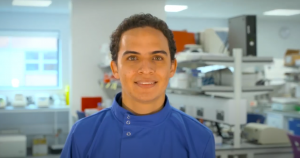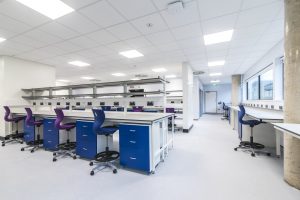David Arcia is one of a team of cancer scientists at the Centre for Cancer Immunology, working to improve the next generation of cancer vaccines.
David is in the final year of his PhD where he has been working alongside Professors Tim Elliott and Edd James on the identification of molecular targets that allow T-cells to detect and destroy cancer cells.
In a process called antigen presentation, aberrant proteins are expressed by cancer cells and chopped into small fragments called peptides, which are then bound to a molecule called MHC-I and transported to the cell surface to alert the T cells that something is wrong. The T-cells then bind to the peptides and destroy the cancer cell.

“Think of the MHC-I as a “hand”, which takes these peptides from the inside of the cell and expose them in the cell surface. The T-cells then grab on to this “hand” holding cancer peptides and kill the cancer cell,” David explains.
“These peptides can bind with different strength to the MHC-I, and it was believed that the stronger the binding, the better the T-cell response. However, different studies in animal models as well as in humans have shown that these strong binders are not always the best candidates for the induction of anti-tumour responses.
“We have been using an integrated approach looking at the abundance and the binding strength of these cancer peptides in a murine model of colorectal carcinoma, in order to better understand the dynamics of the T-cell responses against these targets.”
The study, which is funded by Cancer Research UK, could lead to a better understanding of how to choose molecular targets in potential vaccine strategies against cancer.
David Arcia, PhD studentCancer immunotherapy is evolving at an incredible pace, and new publications show very exciting and promising results in the development of novel therapies to tackle this disease.
Different investigations have used cancer peptides that bind strongly to MHC-I in vaccine strategies in order to boost anti-tumour T-cell responses, but these do not always show good clinical results.
David and his colleagues at the Centre for Cancer Immunology hope that by improving the understanding of the relationship of peptide abundance and binding affinity to MHC, better peptide candidates for vaccination strategies in patients can be identified.
David completed both his undergraduate and masters studies in Medellin, Colombia. During his undergraduate in Clinical Microbiology, he took part in a project looking at the expression of anti-viral proteins expressed in individuals highly exposed to HIV that remain uninfected (known as HIV-exposed seronegative, or HESN). He continued working in research for two years in different projects ranging from HIV to asthma models before focusing his masters on looking at the role of the immune system in shaping the genetic diversity of HIV.

“Ever since I was studying my undergrad in Clinical Microbiology, I became fascinated with the immune system, and particularly with T cells,” he said. “During my masters, I studied how the antigen presentation pathway can modulate the outcome of the T-cell responses in the context of HIV infection, and how viral proteins can mutate key proteins to escape the immune system. This experience fostered even more my interest about antigen presentation and T-cells.
“Towards the end of my masters, I knew I wanted to carry on my post-graduate studies abroad in the same field. Professor Tim Elliott and Edd James’ research was shown to me and I knew I wanted to be a part of it. The international recognition of their research, coupled with the fact that my research interests matched almost perfectly with their field, made the decision quite easy.
“I’m honoured to be a part of their laboratory – our research can contribute to the understanding of the molecular mechanisms that can be exploited to induce better T-cell responses against tumours. Additionally, our results can yield lights into the preferred protein targets that T-cells use in successful therapeutic regimes, which can help improving current immunotherapy strategies by boosting tumour-specific T-cells.”
David’s PhD, which is funded by the Colombian Ministry of Science, Technology and Innovation, is due to end in September and after that, he hopes to foster research relationships between the UK and his home country.

“I have a moral debt with my country, as they have funded most of my career as a researcher so far, from young researcher, to Masters, to PhD,” he said: “I would like to establish connections between institutes of research from Colombia and UK to boost the scientific community in my home country.
“I would also like to continue with a career in immunology, ideally, with an applied approach into improving the way we use the immune system to detect and eliminate cancer cells. Additionally, I have always had a passion for teaching, and would love to engage in activities of transfer of knowledge, both in an academic environment as well as in the general population.”
“Cancer immunotherapy is evolving at an incredible pace, and new publications show very exciting and promising results in the development of novel therapies to tackle this disease. I think the time is right to be studying the immune responses against tumours, and I’m sure that in the near future we will be able to develop immunotherapeutic strategies that can eliminate tumours in a wide percentage of patients,” he adds.
David Arcia, PhD studentThe time is right to be studying the immune responses against tumours, and I’m sure that in the near future we will be able to develop immunotherapeutic strategies that can eliminate tumours in a wide percentage of patients